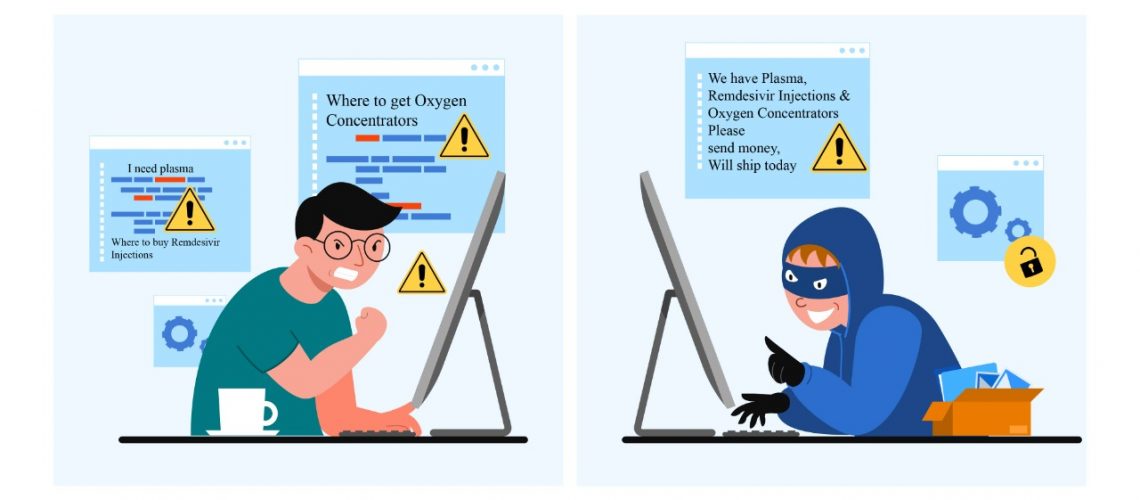Cybercrime amidst Covid 19 :
Cybercrime is a national threat even before the COVID-19 pandemic. The all-presence of technology and the growing rates of internet connectivity due to the rise of remote working, as well as the continued development of recent technologies that provide anonymity, have made cybercrime a low-risk, high-reward journey to both state and non-state actors.
With the employees working from home, the cybercriminals use common phishing tactics to steal data, identity, money from individuals and compromise servers from organizations. Since they are in the midst of the world health crisis and cannot afford to be locked out of their systems, the criminals believe they are likely to pay.
Few Common Cyber Crimes :
1) Phishing – Messages sent by email, social media, texting platforms, designed to trick users into divulging sensitive information (Passwords, Credit / Debit Card, CVV OTP, MPIN, UPIN, and QR Code) and losing money to fraudsters for fake services. Messages often include links and attachments. Scammers impersonate legitimate government agencies, eCommerce sites, and reputed non-profits.
a) Backdoor preferential slot booking on https://www.cowin.gov.in platform
b) Impersonating reputed NGO’s claiming to be providing Plasma, Remdesivir Injections, Black Fungus related medicines, and Oxygen Concentrators.
2)Spear phishing – This refers to spam targeted towards specific individuals, especially the elderly people having their children staying abroad.
a)Providing vaccination for the elderly at home.
b)Providing for Covid 19 related checks like RT PCR etc. at homes.
3) Malware Malicious Apps – Hidden in email connections or apps designed to obtain sensitive personal information and create financial losses.
a)Those people who are unable to buy regular pulse oximeter available in the market are downloading the fake application links having Android – APK & Apple – DMZ, files, circulated through email,
social media, texting platforms, and falling prey to cyber fraudsters losing personal information and incurring financial losses
4) eCommerce/Trading websites – Scammers offer heavy discounts on products on reputed trading sites.
a) Disguised as suppliers in reputed trading websites and seeking 100% advance amounts to transfer to their personal accounts and later they neither respond nor ship the goods.
5) Romance Extortion/blackmail scams – Cybercriminals fakes an identity online and gains trust and then steals or manipulates the victim to extort money.
a)“Proposal turns extortion”, “A Pretty woman is a man”, “Making a gay man pay” and ‘I have you sex recording” are few romance scams. “I have your sex recording” is at its highest now during covid19 times.
6) Customer support scams – The fake toll-free/fake customer support numbers.
a) They mimic the entire process along with the options, voice, and step-by-step process which the official customer support centers have in practice.
b) Once the victim calls, they do social engineering tactics and take control of your entire details, usually, they will use scare-ware tactics like if the details are not updated immediately it will result
in financial or access loss.
7) Work from home scams – Deceitful people create fake job postings to benefit themselves.
a) Data entry & social media (Like/Subscribe/Watch) are the most common ones. You are asked to signed penalty clause agreement and once the work is started, they raise penalties in the pretext of incorrect
data and extort money by sending fake court and police notices.
8) Investment Frauds through Apps – Scamming people to invest money for heavy returns.
a) Power bank App (Now Removed from Play Store) Promised to pay you heavy returns. In the beginning, they pay you and once you invest subsequent times, later they just disappear.
Getting rid of cyber crimes :
1) Download applications only from Android (Play Store) & Apple (App Sore)
2) Be wary of short URLs and information requested on google forms from unknown sources
3) Kindly check the authenticity of the URL if it’s a Phishing link. https://isitphishing.org & https://www.urlvoid.com
4) Never share personal information and intimate pictures or videos online.
5) Always check the header of the email for authenticity when some asks to transfer money on an email, even it is from your boss.
6) Never search for customer care numbers on Search Engines – Open the respective application for the customer care number details.
7) Scanning QR Code or giving/sharing OTP, UPIN, Bank Card, and CVV number means you are transferring the money from your account and NOT receiving it.
8) Use Two Factor Authentication for all applications and emails.
9) Use Complex Passwords (Capital, Special, and Numeric) and reset all your passwords once in three months
10) Never pay any money directly to the seller’s personal/private accounts which are not mentioned on the eCommerce site.
11) Use the latest versions of anti-virus and anti-malware software’s
12) Trust Covid related information from official sites only https://mohfw.gov.in, https://covid19.telangana.gov.in and https://who.int.



